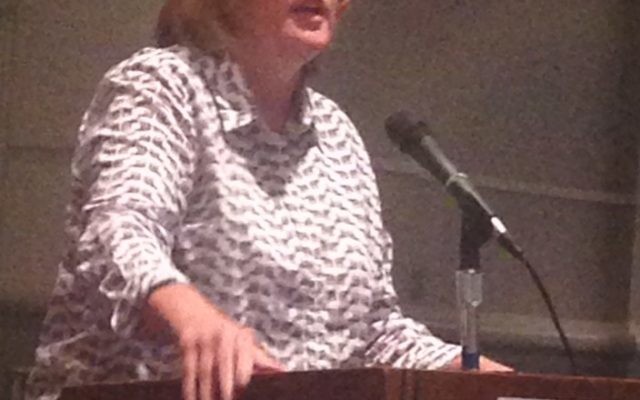Innocence Lost: AA Panel Examines GA Sex Trade
By Cole Seidner
The Ahavath Achim Synagogue opened to visitors with a beautiful entryway, the grass still green though it was getting colder.
Nothing indicated the dark topic waiting to be discussed in the lecture hall except for a little sign by the door, pointing the way to the panel discussion on the problem of the sexual exploitation of Georgia’s children.
Artwork hanging in the front hallway before the event Sunday, Oct. 18, revealed the darkness to come. Local high school students created the art based on the topic of sex slavery.
Beyond the haunting artwork were booths for many support organizations, including Atlanta’s NightLight, Voice Today, Wellspring Living and 4Sarah.
Lisa Cohen of CNN initiated the discussion, introducing the many ways CNN has tried to aid those lost in sex slavery. Because of CNN’s help, the Atlanta hub of sex traffic has been brought to light, easing the connection between those in need contact and those who can help.
Sen. Renee Unterman (R-Buford) then described the legislation she has managed to usher into Georgia law, including this year’s safe-harbor law, a huge step forward that allows minors who are forced into the sex trade to be treated as victims in the eyes of the law and not as criminals guilty of prostitution.
The children of Georgia have a safety net now to direct them toward rehabilitation after the trauma.
The General Assembly passed Senate Resolution 7 this year to create a trust fund for that safety net, with the money coming from fines against sex traffickers and an annual fee on adult entertainment establishments. That measure will go before Georgia voters as a proposed constitutional amendment next year.
Vernon Keenan, the director of the Georgia Bureau of Investigation, explained how delicate it is to track down anyone interested in the sex trade.

First investigators have to find websites that are involved, all of which use code words to advertise underage sex workers. They then have to track and trick their way to any one person searching for child pornography, and maybe even then it’s not the right person.
Atlanta has a particular problem as the home of the busiest airport in the country. Customers of the sex trade can fly in the morning and leave by night without anyone knowing the crime they committed.
Many times the speakers at Ahavath Achim mentioned training to help identify those committing the crimes, as well as those in need of help, but it will take a while for these ideas to come into play and even longer to train all security in the airport to be able to recognize the signs. Once more people know and take action, things can go faster.
Although Unterman and Keenan are high-profile officials in the fight against sex trafficking, the Ahavath Achim event reached its emotional peak when two survivors spoke. Although neither of them was a trained speaker, the emotion behind every word made them especially moving. It was impossible to take mind of anything but what they were saying.
Photos by Cole Seidner





comments